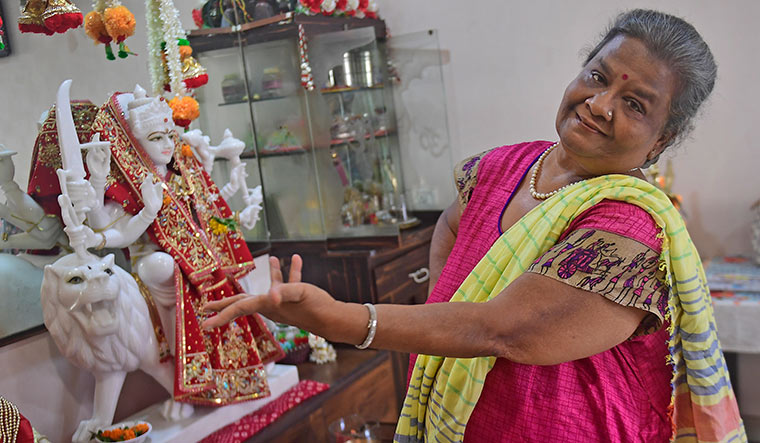AT 62, KUSUM PODAR moves to 'London Thumakda', her favourite dance number, with the joyful abandon of a child. She loves dressing up, spends her afternoons in the company of friends playing poker and her evenings singing and dancing to devotional songs. Very recently, she appointed a music teacher to come home every week and teach her Indian classical music. On the face of it, Podar is a happy granny with an infectious energy, living by herself in a 1,000sqft apartment in Mumbai. Her siblings and her daughter's family visit her a few times a week.
However, upon a closer look, her frailties are evident. A breast cancer survivor, Podar lives in the constant fear of a relapse. Six years ago, she was diagnosed with stage four breast cancer, and every time she looks in the mirror, she is reminded of those harrowing days when her hair fell in chunks and her skin colour turned charcoal black, making her unrecognisable even to herself.
Breast cancer is caused by the uncontrolled growth of abnormal cells in the breast. Its severest form, which Podar suffered from, is when the uncontrolled cancer cells invade other healthy breast tissues and travel to the lymph nodes under the arms. "One day I suddenly found this big lump in my right breast and, before I knew it, I was diagnosed with cancer," says Podar.
Three months post her surgery, Podar underwent eight rounds of chemotherapy at Breach Candy Hospital, followed by 22 rounds of radiation. Several times, she found herself being sucked into depression, compounded further by loneliness. "There were times when I would get up in the morning and find my dress and bedsheet wet with pus and I would shudder at the sight," she says. She is certain that it was her positivity and willpower which pulled her through. Even now, the scars remain. Her skin still has dark patches and she is now on heavy dosages of the drug Letrozole, which keeps the body from producing oestrogen. But Podar brushes the negativity aside, saying, "I still feel beautiful and awesome within. I will not lose my enthusiasm for life, just because a disease has decided to strike me," she says, beaming.
If the gene editing tool CRISPR (clustered regularly interspaced short palindromic repeats) proves its efficacy in the treatment of breast cancer, patients like Podar will no longer have to undergo the trauma of chemotherapies and radiations, which are distressing and highly taxing on the body and the mind. However, the success of CRISPR in treating cancer remains an idea too good to be real, say experts.
"CRISPR is a very promising technology as you can edit a gene precisely with some off-target effects. So, it may have some role in the future of cancer treatment, but only once it is ready for therapeutic use," says Dr Sudeep Gupta, director, Tata Memorial Centre Advanced Centre for Treatment, Research and Education in Cancer, Navi Mumbai. "Yet, I doubt that it will be 100 per cent efficient. In the treatment of breast cancer, for example, if you have 100 billion cancer cells in the body and you want to replace the defective gene in all of those cells, then you need a tool which is extremely efficient. It has to correct the particular gene in exactly each and every cell because even if 1 billion cells remain of the 100 billion, they can cause a relapse. So, CRISPR has a long way to go in refining its efficiency. Even though I hope we have a situation where patients no longer need to undergo those harrowing stages in the treatment of cancer, I do not foresee CRISPR being so effective even in the next five to ten years."


